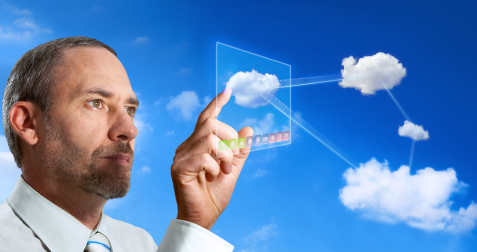The big question is how will companies adopt with Cloud ERP? According to Microsoft it will be a 50/50 mix of people using traditional on-premise ERP and those electing to move to the cloud. There are many things to consider if you are selecting a new system. One of the most important decisions you can make is on the platform you will choose. This lays the groundwork for all decisions moving forward.
Cloud Computing is not new. In fact, Salesforce.com pioneered this technology with multi-tenant architecture back in 2000. So with an eleven year history, they have grown to be a powerhouse in the cloud. However, most ERP vendors tried at first to apply an Application Service Provider (ASP) model in the early 2000’s and did not have much luck. Can they reshape themselves as Cloud Computing providers?
What are the differences from and ASP and a Cloud ERP company? Well first off, ASPs worked under the premise that they were simply hosting the software and data in a data center. There was a complete separation of customers due to the fact they each had their own server or set of servers. True cloud computing is more than just a marketing gimick. It is the pooling of resources to provide fast response and a virtual division of data and sessions. The analogy that Salesforce.com has used in the past is multi-tenant, meaning just like an apartment building, you lease an apartment (or a set of resources) that are separate from other renters, but using the same infrastructure.

Unfortunately, many ERP providers are going back to the ASP model and calling it cloud computing. Yes, it is easier for them to get up and running, but in the long run, it is more costly. Each client is now on their own infrastructure and updates have to be managed separately. In a true multi-tenant environment, you can upgrade everyone at the same time.
The client companies who are looking at new ERP solutions need to consider these things and more. We have listed below some of the key benefits and concerns a buyer needs to be aware of when looking at Cloud ERP.
Cloud ERP Benefits
- No more heavy IT expenditures – no servers to buy
- Less Staff to maintain the On-Premise systems
- Reduced Costs in workstation expenditures – A net computer would work fine
- Easily Expandable – just buy more licenses
- Reduced costs of communications for large multi-site companies – possible elimination of site-to-site bandwidth
- Costs hit the Profit and Loss statement, not the Balance Sheet – before you had to capitalize the large expenditure of an ERP, now you can expense the license costs.
Disadvantages of Cloud ERP
- Financial Data part of the Cloud ERP system – Can you trust your provider?
- Integration to other systems may be more difficult
- Higher costs of Internet bandwidth
- Indirect access to your data – will likely have to use an API rather than direct data access
- Full backups will be dependent upon pulling data down from the cloud, thus possibly resulting in less frequent backups
Cloud ERP and the next few years
The future of Cloud ERP is going to be an exciting one. People will be transitioning technologies and as a result, many legacy systems will likely be retired. Software that is running on old platforms will begin to disappear. Only those providers with the most up to date technologies will be able to survive, because Cloud updates happen so fast and so regular. Imagine having pushed updates every quarter that just appear. No more waiting for disks and announcing downtime to your users while you test, load, and then patch updates. The next five years should be very exciting as more and more providers and customers transition to Cloud ERP.
